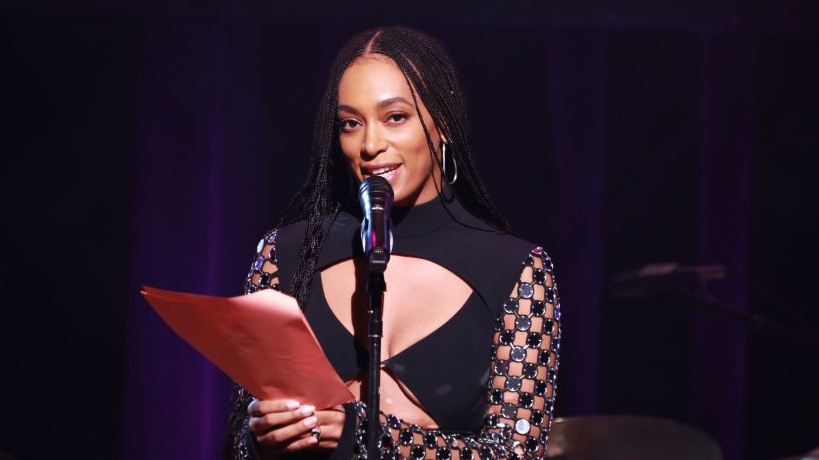Solange Knowles stood in front of a packed house at The Town Hall in New York and delivered a candid speech while accepting the inaugural Lena Horne Prize for Artists Creating Social Impact. The artist thanked her family and friends, honored the people that came before her and showed gratitude for her aunties and cousins “who weren’t really aunties or cousins.”
“This award means the absolute most to me because the love that I feel in this room feels just like the love of the people that I just named who held me,” the 33-year-old said. “It is an extension of and feels like my mother and my sister’s and my friends’ love, the love that inspires me the most. I will hold this close and deep to my heart forever and ever. Gratitude doesn’t even seem like a large enough word.”
According to The Town Hall, The Lena Horne Prize "honors artists creating social impact with their platform and who inspire the next generation of change-makers."
Although the singer took the time to honor her loved ones, she also used her speech as an opportunity to share the trials and tribulations of her journey.
“I know that these speeches are meant to be aspirational, leaving you feeling warm and fuzzy and inspiring you to be yourself," Knowles said. "But I’d like to have the space right now to be all of these things. I’m honored to be all the things that my mother and my dear friend Toyin [Oijih Odutola, a visual artist] have said, but I’m also in a moment of great transition and transformation and we all deserve the space to be all of those things — the space to love my people, to vow to continue fighting for us, for our peace, uplift us, make us seen and heard, celebrate our undeniable supreme light while trying really hard to find my own.”
The singer, who has been on a personal and relatively private journey since divorcing her husband, talked about the impact of her latest album When I Get Home.
“This album marked a colossal pivot moment in my life that I’m still in the thick of the lessons today,” she said.
Solange added that the album came out during a time when her “life changed drastically.”
"Suddenly there came a great, great fear. Fear of the unknown, fear of trust, fear of love, fear of silence, fear of having to confront things and pain that I have buried too deep, deep inside," she said. "It was easy for me to show up and be the unstoppable woman for everyone else, but terrifying for me to be that woman for myself.”
The artist announced her separation from her husband on Instagram last year. During the difficult times, Solange said it was her mother who made her "feel a little less afraid."
"She came over every day for a few weeks to cook me okra and brown rice and cornbread with her little book of prayers," the award recipient said. "My beautiful hometown and neighborhood of Third Ward Houston held me. My dear friends, all of which are here tonight, they lifted me so high with so much love and so much hope.”
According to The Town Hall, the Grammy Award-winning singer "has used her platform to advocate for representation and justice while providing constructive and empowering messages."
"With the release of her critically acclaimed albums, A Seat at the Table (2016) and When I Get Home (2019), Solange has navigated through themes of self-reflection and origin, empowerment, grief and healing that have resonated with millions of voices," The Town Hall stated. "This coupled with her performance art work has led to a defining career of music, visual art, and activism."
The Town Hall added that "Lena Horne was a Legendary Brooklyn-born Grammy and Tony-winning singer, dancer, activist, and actress who performed on stage, in film, and on TV from the time she emerged as a starlet in the 1930’s until her death in 2010."

